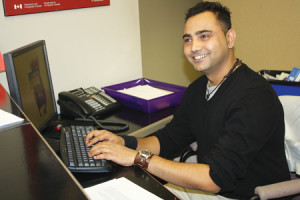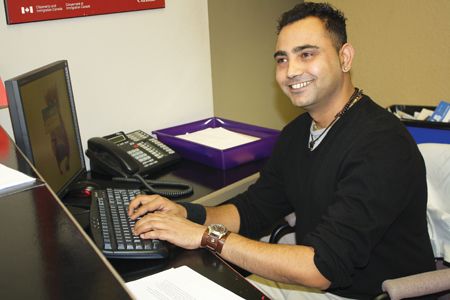 Vic Rizal escaped civil unrest and ethnic cleansing in his homeland of Bhutan, and made his home in Canada. He settled in Lethbridge and works at the front desk of the Lethbridge Family Services Immigrant Services Centre. Sun Times photo by Richard Amery
Vic Rizal escaped civil unrest and ethnic cleansing in his homeland of Bhutan, and made his home in Canada. He settled in Lethbridge and works at the front desk of the Lethbridge Family Services Immigrant Services Centre. Sun Times photo by Richard Amery
When Vic Rizal first arrived in Lethbridge just under three years ago from a Bhutanese refugee camp in Nepal, he had his eye on the city. After civil unrest and ethnic cleansing that displaced approximately 100,000 people, Rizal wanted a change for the better and thought Canada could offer new opportunities.
Like many newcomers to the country, he believed living in a smaller centre would make it easier to adapt to a whole new culture.
“It’s like living in an apartment for your whole life and then buying a house. It takes some time to adapt to living in the new house,” said a very articulate Rizal, who works the front desk at the Lethbridge Family Services Immigrant Services Centre at 703 2 Ave. S.
The lobby of the office is always full of newcomers seeking a brand new start, which keeps him busy helping them the best he can.
He, like a lot of Nepalese, has really taken to Lethbridge living. They landed in Winnipeg first, then decided where they wanted to go from there.
“You can go to the United States, Canada or Australia, New Zealand. I liked Canada. The winter is warm, the people are very friendly,” Rizal said.
He lived in two other countries previously — Nepal, and India, where he studied before settling in Canada. He praised our country’s publicly funded universal health care and education systems. “There are lots of opportunities here,” he said. Plus, he had an uncle already living in Lethbridge among a local Nepalese community of approximately 450 people, which made jumping into a brand new culture, language and lifestyle a lot easier.
“A lot of newcomers think it is better to move to a smaller centre to learn the language and the culture before they move to a bigger city,” Rizal observed.
He said he will likely stay in Lethbridge as he has family here and is putting down roots. That’s good news for Brenda Hunik, Lethbridge Family Services Education and Outreach co-ordinator. “We won’t let him leave,” she chuckled.
The centre offers programming such as training in language and culture. “Last year, we served 1,000 immigrants and refugees. It’s definitely been growing,” Hunik observed. “A lot of them are more comfortable in a more rural environment.”
Canada opened its doors to 280,000 immigrants in 2010 and has accepted more than 200,000 newcomers annually since 2000, according to Citizenship and Immigration Department statistics. In the mid-1980s, fewer than 100,000 immigrants per year came to Canada.
New census data shows the population of Lethbridge outpaced the national growth rate over the last five years — a period of time that saw the country spiral into the most serious economic tailspin since the Great Depression.
Statistics Canada released the first batch of numbers from the 2011 census on Feb. 8 and the population of Lethbridge increased by 11.8 per cent since the last census in 2006.
When the 2011 census was taken last May 10, the population of Lethbridge was 83,517, compared with 74,685 from the 2006 census.
That increase in population is consistent with the growth rate shown in city censuses. Lethbridge has enjoyed slow but steady growth over the past few years, averaging between 1.5 and two per cent, Mayor Rajko Dodic told the Lethbridge Herald.
Last July, the city completed a community sustainability plan which contains projections for the city’s growth over the next decades. The projections show the city having a population of 95,000 by 2020, 105,000 by 2030 and 130,000 by 2050.
“Most of it would be immigration rather than birth rate changes,” Dodic said. “The birth rate has generally gone down over the years but we are a destination point for immigration.”
While Statistics Canada puts Lethbridge’s population at 83,517, the city’s own figures peg the population at 87,882. The difference of 4,365 is due to the timing of the two censuses.
“Alberta has been pretty aggressively focusing on immigration to address the labour shortage,” said Hunik. She noted the province has been focusing a lot on immigration possibly filling a labour shortage, mostly up north, due to a booming energy sector.
“Most of Lethbridge’s newcomers over the last couple of years are from Nepal,” she said. “And second, we have a lot of Spanish-speaking newcomers but the largest is Bhutanese refugees.”
The Lethbridge Family Services Immigrant Services Centre has a Newcomers Network that encourages the exchange of information between immigrants and the many organizations in our region that provide the services newcomers need. There is an open house March 21 at Southminster Hall, 1-6 p.m., where newly arrived immigrants can meet face-to-face with staff from different organizations. There is no charge to attend. Interpreters will be provided. For more information, phone 403-320-1589.
“It provides an opportunity to meet some of the organizations that provide the services they need,” Hunik said, adding approximately 75 participants are expected. This marks the first year something like this has been done on a large scale, she added.
“We’re thinking of innovative ways to engage organizations with the community.”
Learning the language is often the largest hurdle, said Rizal. “You have to know the language first before you can understand the culture,” he said. “We want to learn it and work.”
— With Lethbridge Herald files

